SCBC students win accolades at the 11th Russian Language Day competition
On May 28, the 11th Russian Language Day competition and Short Video Contest to commemorate the Year of Russian-Chinese Sports Exchange for the renewal of friendship was held online by the Russian Language Center of Guangdong University of Foreign Studies (GDUFS) and the Consulate General of the Russian Federation in Guangzhou. Supervised by Yan Qiuju and Е. В. Yasinovskaya (Ясиновская Е. В. ), Su Jiacheng, Wu Haotian and Liang Boying of Russian language of the School of European Languages and Cultures stood out from nearly 100 finalists and won respectively the second prize, third prize, and honorable mention, thanks to their solid language skills, excellent performance and great short videos.
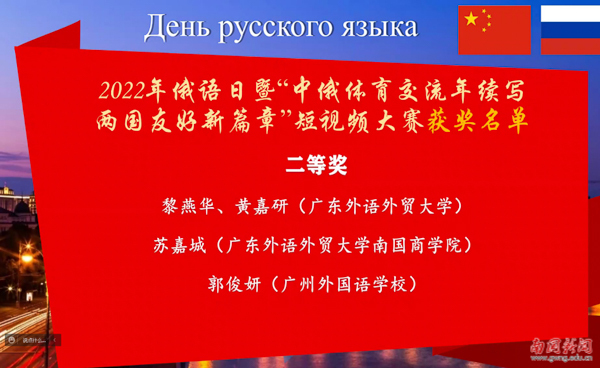
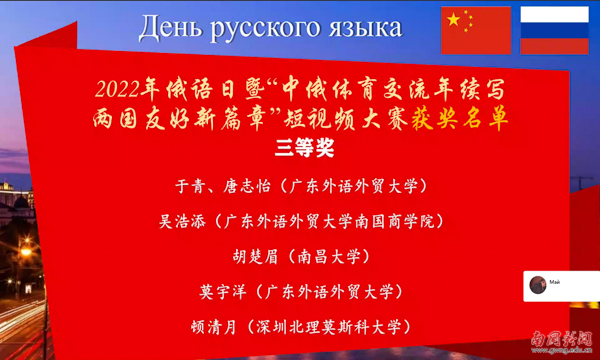
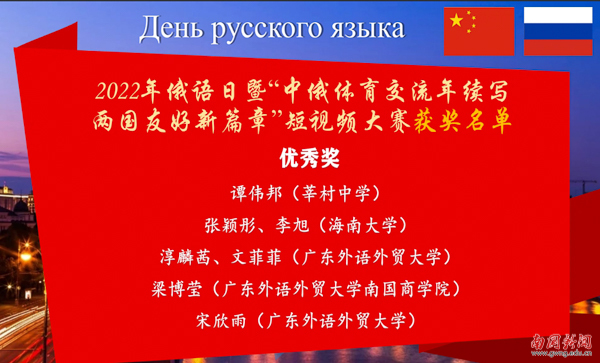
The theme of the contest was Year of Russian-Chinese Sports Exchange. The contestants who won the primary rounds of written and oral exams could then submit Russian language videos to compete for prizes.
Su Jiacheng's work documented how he dealt with stress in study by cycling and other sports and tried to make progress in terms of moral, intellectual, physical and aesthetic development in the face of the epidemic. Wu Haotian's work started with his love of basketball, showing how he reflected on life through the game and finally came to realize that no success in life could be achieved without time and hard work. Liang Boying's video took Bing Dwen Dwen, the Beijing Winter Olympics mascot, as a lead-in image, showing Russian people’s love for the mascot and her pride as a Chinese in the success of the Winter Olympics 2022.
The Russian Language Day competition offered a great opportunity for SCBC students to showcase their Russian language skills and the professionalism. They were very imaginative and creative in using new media technologies to make their short videos. The competition was also a broad platform for mutual understanding between young people of both countries and played an active role in promoting friendship between the two peoples as well as in training Russian speakers in China for better communication of Chinese story.
SCBC holds annual foreign-related affairs work conference
On the afternoon of May 31, the 2022 annual foreign-related affairs work conference was held in the International Conference Hall. The conference discussed and made arrangements for the work of ensuring security and stability in foreign-related affairs, and reviewed SCBC’s 14th Five-Year Plan of Education Internationalization. Present at the conferences were heads of all schools, faculties and departments, Center for International Cooperation & Exchange, Office of Development & Planning, Office of the Registrar, Human Resources Office, Office of Academic Research Affairs, Center for Polar Issues Studies, Center for Multilingual Translation and Dissemination Studies of Chinese Culture, Research Base of International Economic and Trade Rules and Standards, and Institute of Digitized Science and Technology. Vice President Lai Zhili presided over the conference.
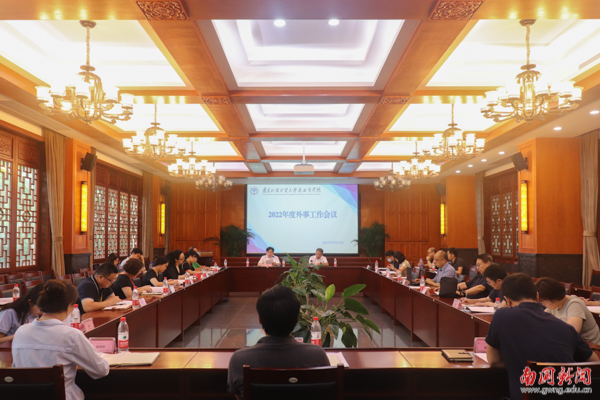
The Center for International Cooperation and Exchange proposed an 8-point framework for the arrangement of foreign-related security and stability work. The basic principle was that all relevant units should further raise political stance to help create a safe and stable political environment for the upcoming Party Congress as well as for the high-quality, international and quality-oriented development of SCBC. The conference put forward guidelines on how to carry out internationalization work for functional departments, schools, faculties and departments, and research units respectively:
Functional departments should integrate internationalization into the “bench-marking program and continuously improve the coordination, supervision, management and service in the work of internationalization.
Schools, faculties and departments should assume main responsibility for the work of internationalization and integrate internationalization into their own 14th Five-Year Plan and the “surpassing program”. The key tasks for these units include the internationalization of disciplines, majors, curricula, and faculty, the internationalization of collaborative training to turn SCBC students into versatile, pragmatic and innovative leaders, and the internationalization of key metrics for discipline evaluation and the development of master's degree programs and first-class undergraduate majors.
Research units should formulate and implement specific action plans for high-quality international cooperation, and produce a number of research results with a high degree of intensity and visibility.
The participants discussed the details of the 14th Five-Year Plan of Education Internationalization and made constructive suggestions for revision.
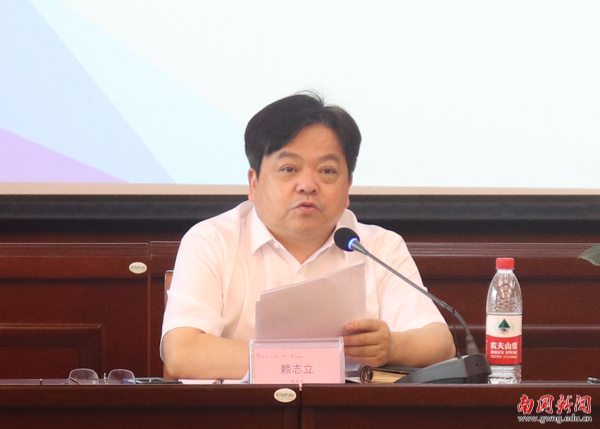
At the end of the conference, Vice President Lai Zhili delivered a concluding speech. He emphasized that the internationalization strategy was a critical move for SCBC to build itself into a high-level application-oriented private university. Therefore, he called on every faculty and staff member to make concerted efforts and forge ahead to achieve high-level internationalization, making it distinctive of SCBC.
To ensure a full implementation of all the tasks for internationalization in the 14th Five-Year Plan, Lai Zhili highlighted the following three requirements:
First, all units must strictly implement the approval system for foreign-related affairs and activities to ensure political security and ideological soundness.
Second, relevant units must work together to facilitate the implementation of internationalization. Specifically, the Center for International Cooperation and Exchange should take the lead in the introduction of foreign-related systems; the Office of the Registrar should work with the schools to develop internationalized majors and courses; the Human Resources Office should work with the schools to build an internationalized faculty; the Office of Academic Research Affairs should give guidelines and assistance to all the research institutes and schools to conduct internationalized scientific research and social service; and the schools should assume main responsibility for carrying out internationalized education projects, take effective measures to encourage students to study abroad so as to significantly increase the proportion of students with overseas study experience and the number of students studying abroad, and improve the mechanisms for running international classes and classes of collaborative education programs.
Third, all relevant units must keep a detailed ledger for internationalization work. Driven by the goal of high-quality internationalization and taking advantage of the advanced educational resources from overseas countries, the units should take targeted measures to deliver on their own “surpassing program”.